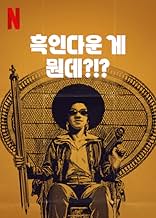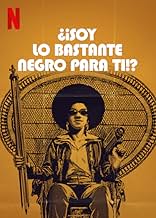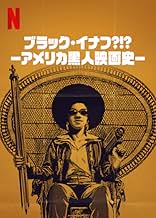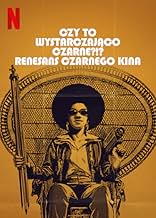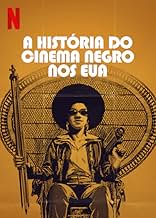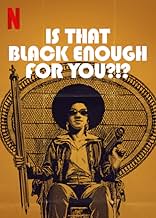Il critico culturale ed esperto di storia Elvis Mitchell racconta l'evoluzione, oltre che la rivoluzione, del cinema nero dagli esordi ai film incisivi degli anni '70.Il critico culturale ed esperto di storia Elvis Mitchell racconta l'evoluzione, oltre che la rivoluzione, del cinema nero dagli esordi ai film incisivi degli anni '70.Il critico culturale ed esperto di storia Elvis Mitchell racconta l'evoluzione, oltre che la rivoluzione, del cinema nero dagli esordi ai film incisivi degli anni '70.
- Premi
- 4 candidature totali
- Narrator
- (voce)
- Self
- (as Louise Archambault Greaves)
- Self
- (as Jim Signorelli)
Recensioni in evidenza
The bad: but after an hour this documentary veers of into all sorts of directions, becoming disjointed and long in the tooth.
It is as if this director simply had no control over his urge to namedrop as many film classics as possible and then start analysing what was wrong with them.
Recommended watch for the first hour, but I fear not many will stay focussed till the very end, because this documentary unfortunately peters out after the first hour.
One of the more unexpected aspects is it's inclusion of experimental films, from animation to split screen. There is minimal focus on this but it does highlight ambitious storytelling and filmmakers responses to a restrictive system.
Couple of comments: this is the directing debut of longtime writer, producer and film critic (including at one point for the New York Times) Eric Mitchell. Here he fondly looks back to the golden years of black film making, which he identifies as 1968 to 1978. And "film making" is to be understood in a broad sense: not just actors, but also producers and directors and anyone else involved directly and indirectly. Everyone knows of the phenom that was "Shaft" but as Mitchell demonstrates, there were so many other noteworthy black films in that era, many of which were made outside of the Hollywood studio system and hence never seen by most of us, including many of the so-called blaxploitation movies ("blaxploitation is the commoditization of blackness", observes one of the talking heads). The works of Gordon Banks and Melvin Van Peebles get extensive attention, and along the way we get dozens and dozens of movie clips, one better/more intriguing than the other. It leads one (or at least me) to want to see these movies. It was amazing for me how quickly these 2 hrs. And 15 min came and went, and a genuine pleasure to watch this from start to finish. Last but not least, in the movie's opening credits, the title is showing as "Is That Black Enough For You?!? How One Decade Forever Changed the Movies (And Me)".
"Is That Black Enough For You?!?" premiered in early October at the new York Film Festival to immediate critical acclaim, and it is currently rated 100% Certified Fresh on Rotten Tomatoes, and for good reason. If you have any interest in a slice of movie history which most of us know very little about, I'd readily suggest you check this out, and draw your own conclusion.
The documentary delves deep enough to uncover marginalized black films intended for black audiences that have gone unnoticed by the media and the general public.
The movie's editing becomes unsteady when it jumps back and forth in time, with testimonials that elongate the script. The script also places a heavy emphasis on black films prior to 2000, leaving the film feeling incomplete or as if it is anticipating a sequel.
Lo sapevi?
- BlooperWhile discussing Le ali della libertà (1994), the narrator identifies Rita Hayworth as white. Hayworth's real name was Margarita Carmen Cansino, and she was of Romani descent (an Indo-Aryan ethnic group, also known by the term "Gypsies"). She had her name changed, and appearance slightly altered, to aid her career. Prior to that, as Rita Cansino, she had been limited to smaller exotic roles.
On a related note, towards the end of The Shawshank Redemption, Andy has replaced the poster of Rita Hayworth with a poster of Raquel Welch. Welch was born Jo Raquel Tejada, but went by "Raquel Welch" for the sake of her career (to avoid getting trapped into roles available to Latinas). She did not acknowledge her true heritage until she worked on American Family (2002).
- Citazioni
Harry Belafonte: Not one picture that I turned down did I regret not doing. I didn't resent any of them. I'm glad others got an opportunity and went off and did it, but my initial... First and foremost, I'm an artist. I'm an actor. And I came out of a school with Marlon Brando, Walter Matthau, Rod Steiger, Tony Curtis, with a director that gave us no quarter. I'm not gonna do anything other than what I think is worthy of being done. And fortunately for me, I was a runaway success in the world at large because I had a globe so passionately approving of my presence in their midst that nobody could dismiss the fact that that thing on the horizon called Belafonte could really not be fucked with. Because anytime anybody came up and gave me an ultimatum, I said, "Fuck you. I'm going to Paris. I'll probably live there if I like, but I... I have a destination that answers your denial of what I could be."
- ConnessioniFeatures A Fool and His Money (1912)
I più visti
- How long is Is That Black Enough for You?!??Powered by Alexa
Dettagli
- Data di uscita
- Paese di origine
- Sito ufficiale
- Lingua
- Celebre anche come
- هل يكفيكم هذا السواد؟!؟
- Aziende produttrici
- Vedi altri crediti dell’azienda su IMDbPro
- Tempo di esecuzione2 ore 15 minuti
- Colore
- Mix di suoni


